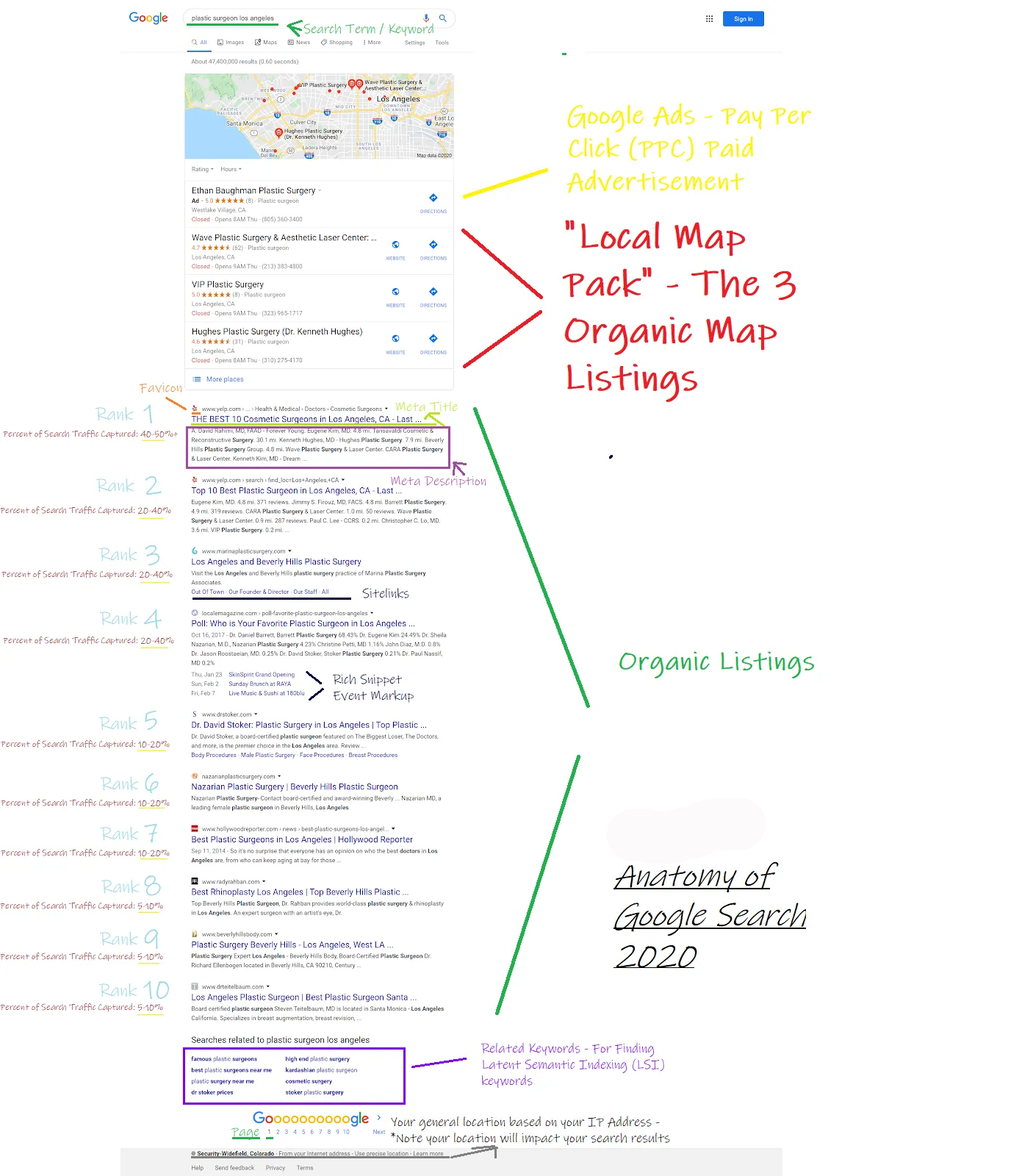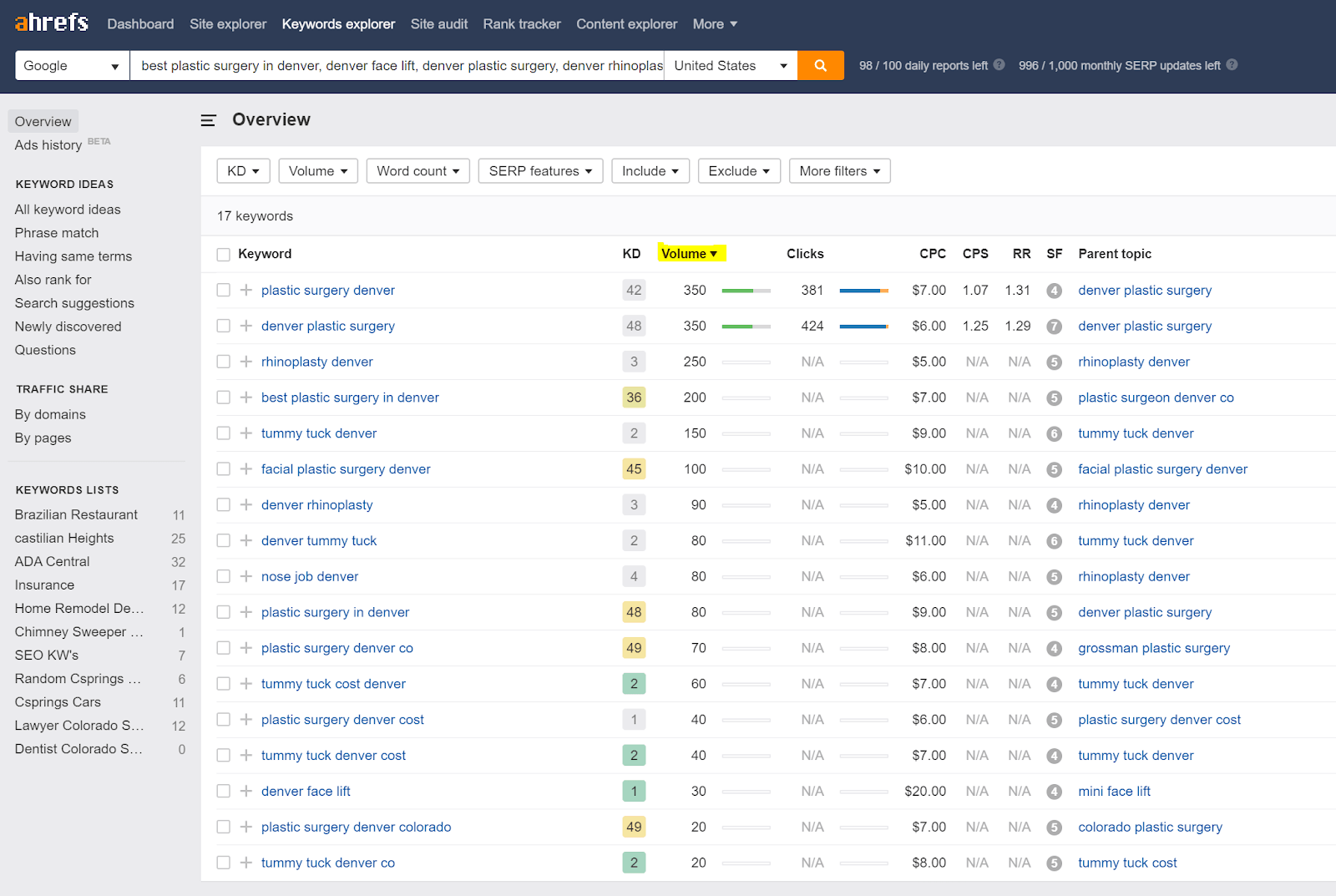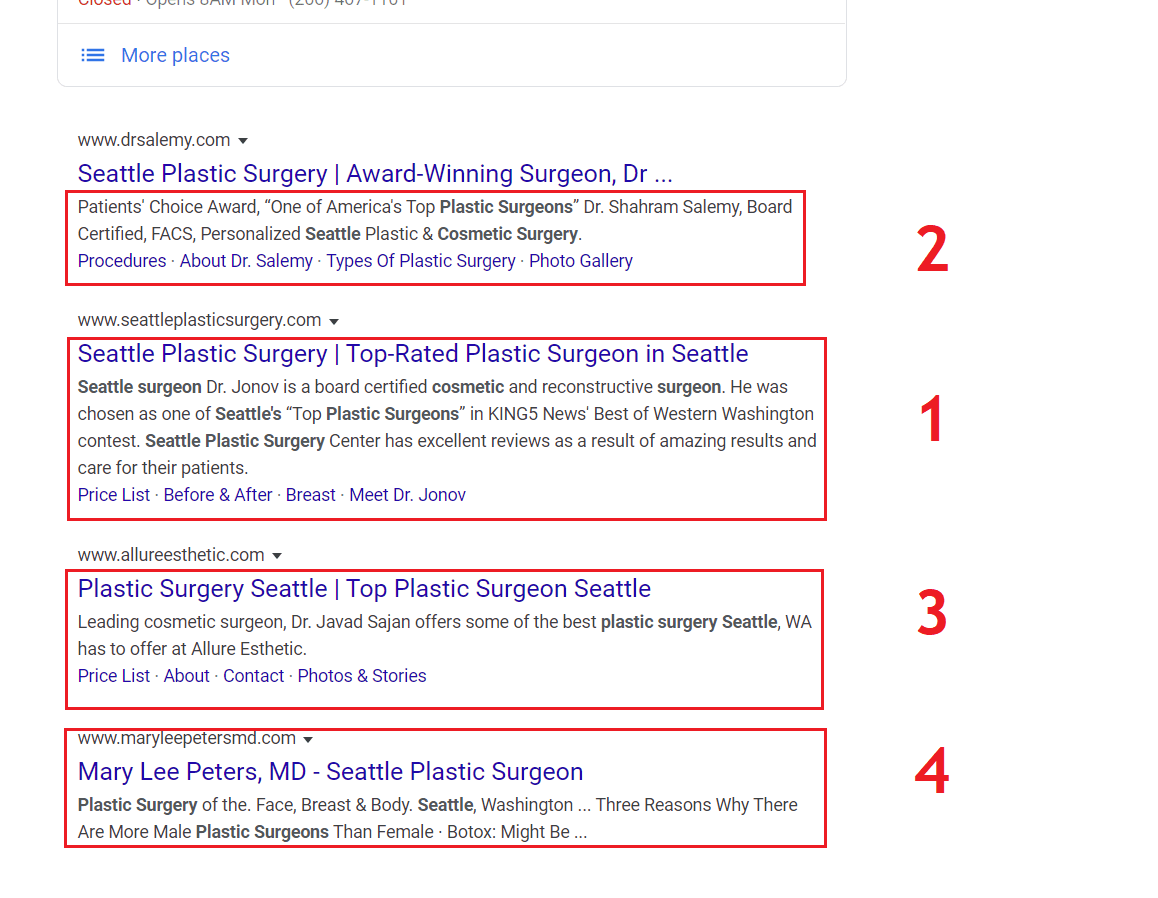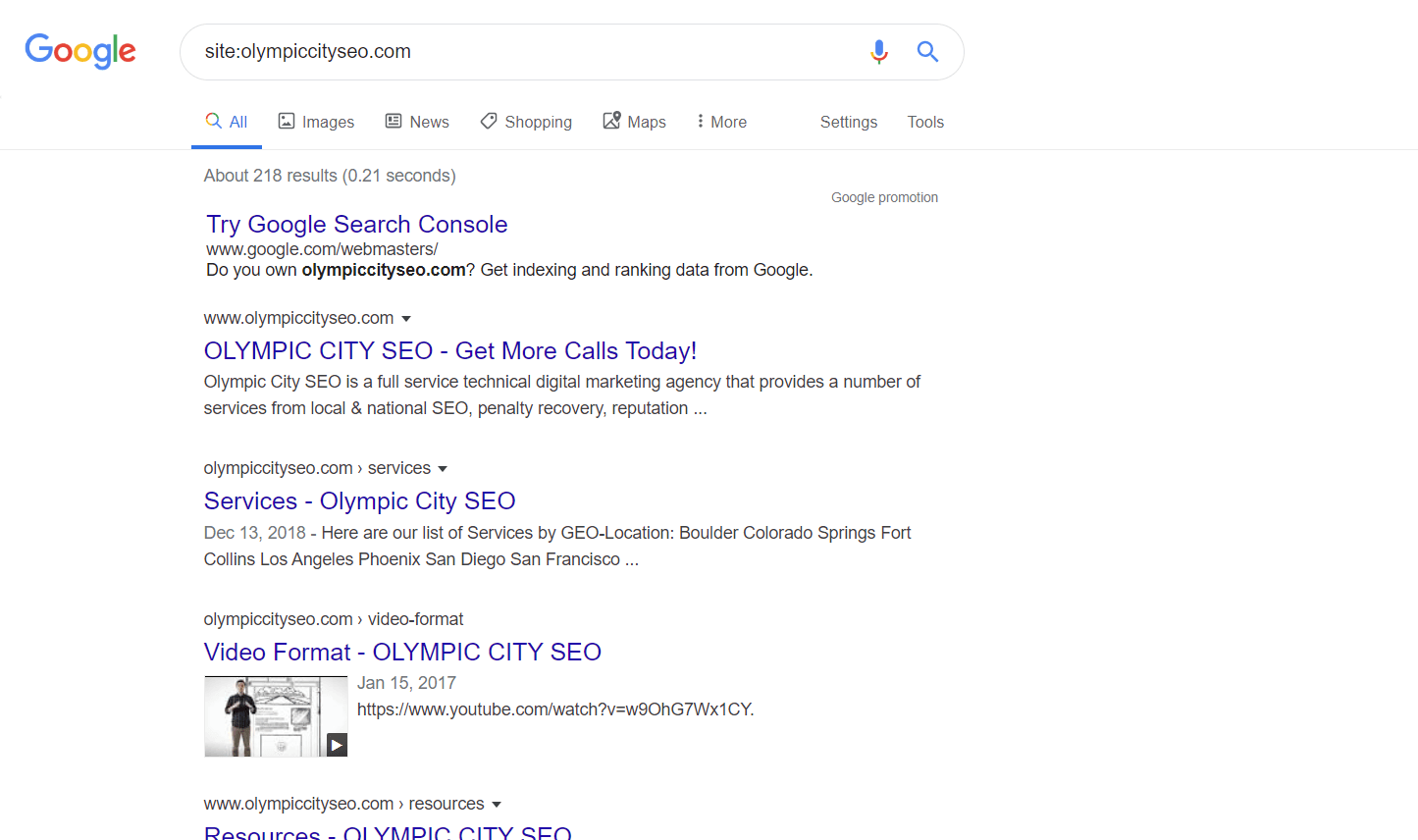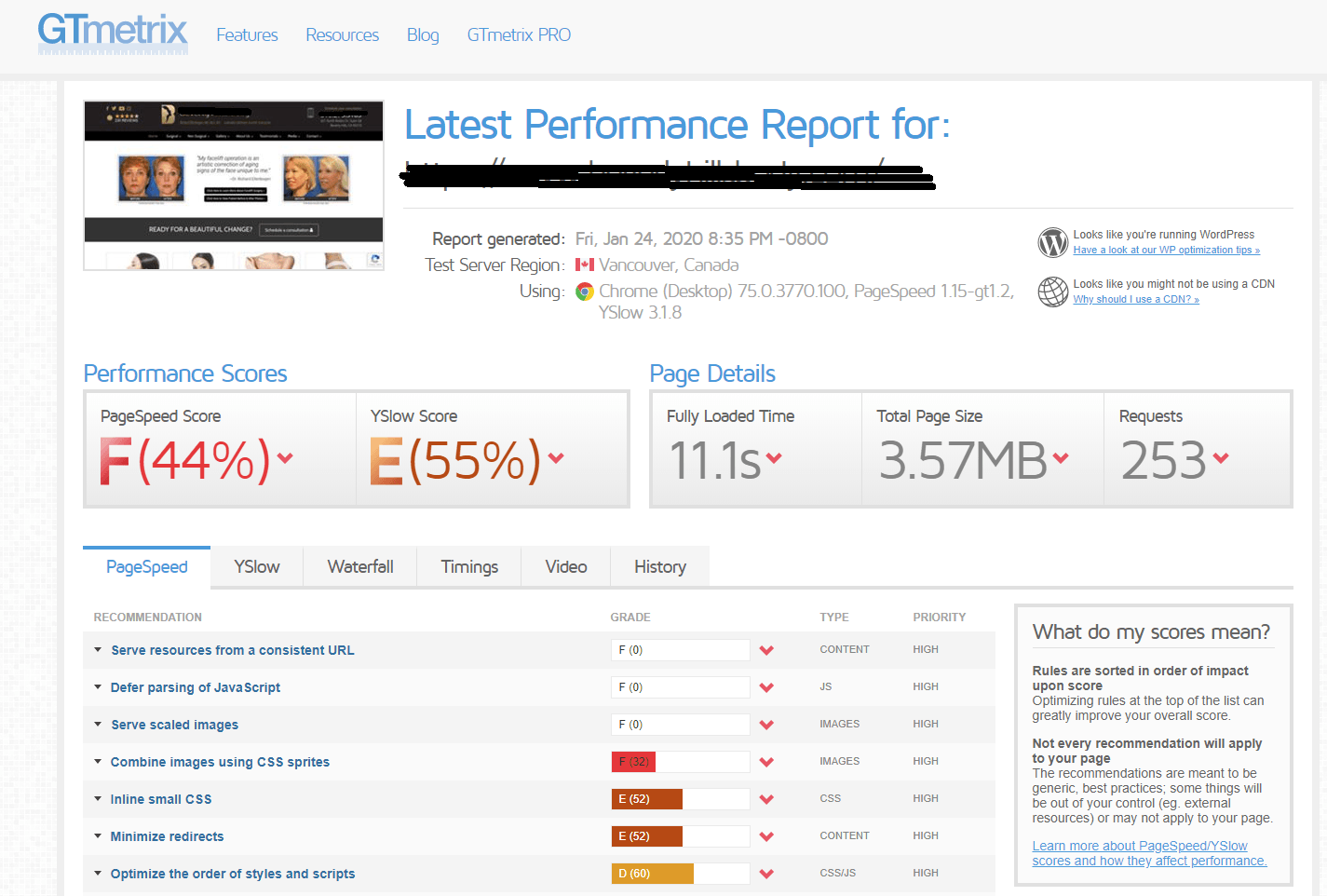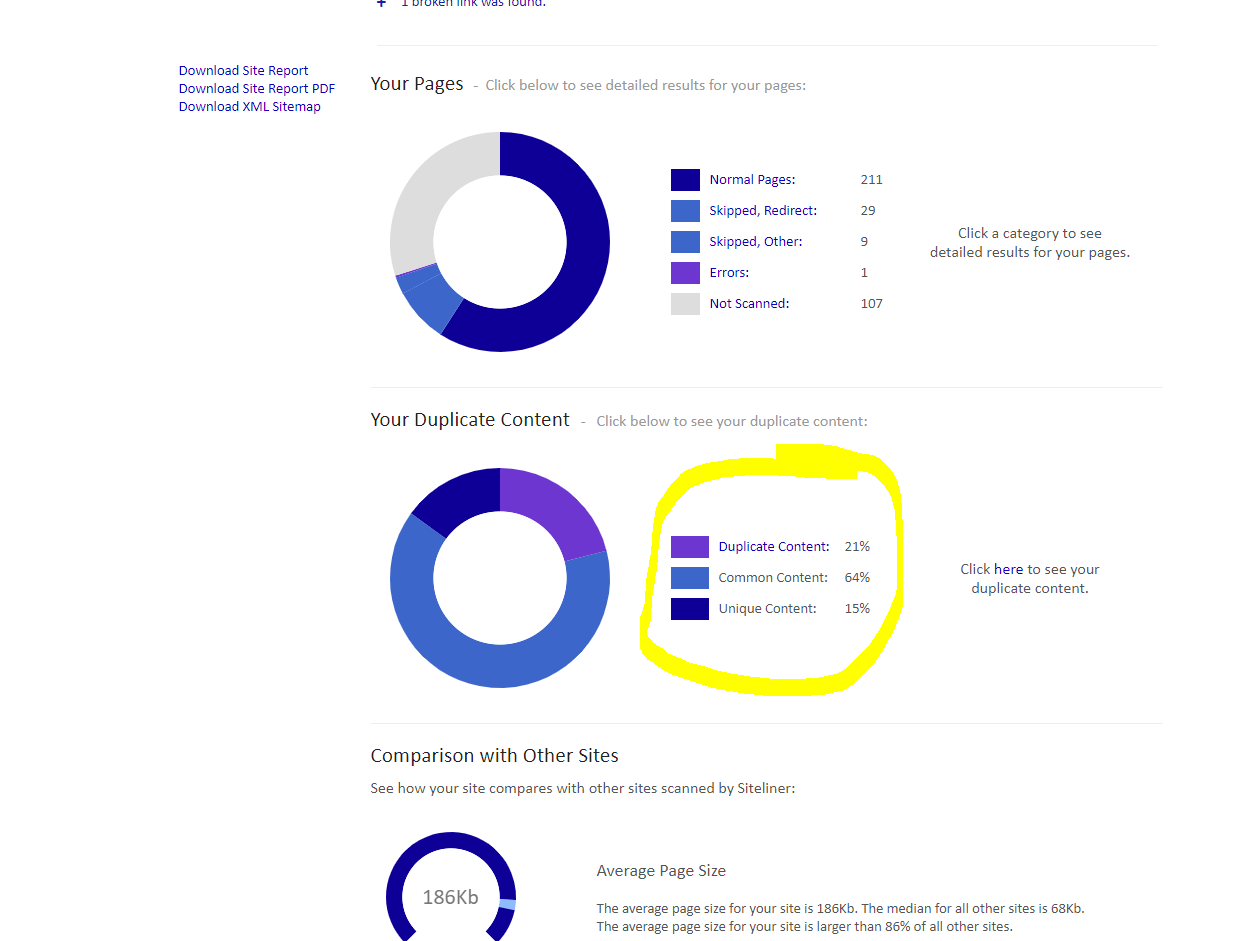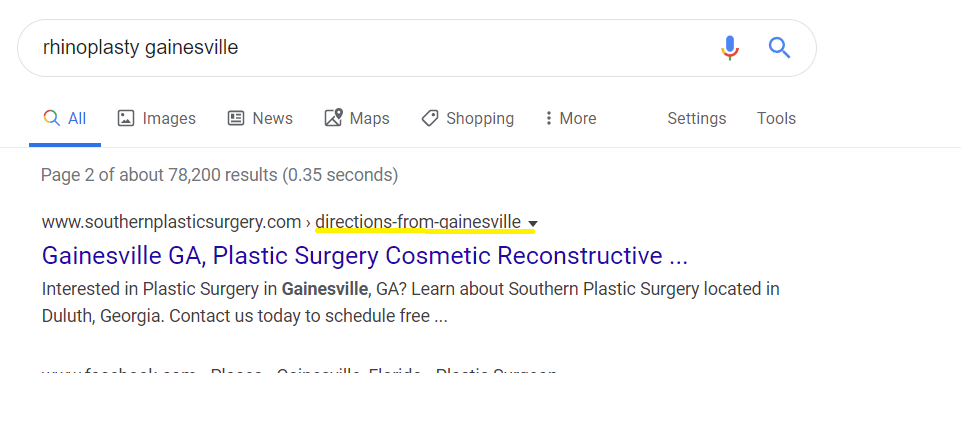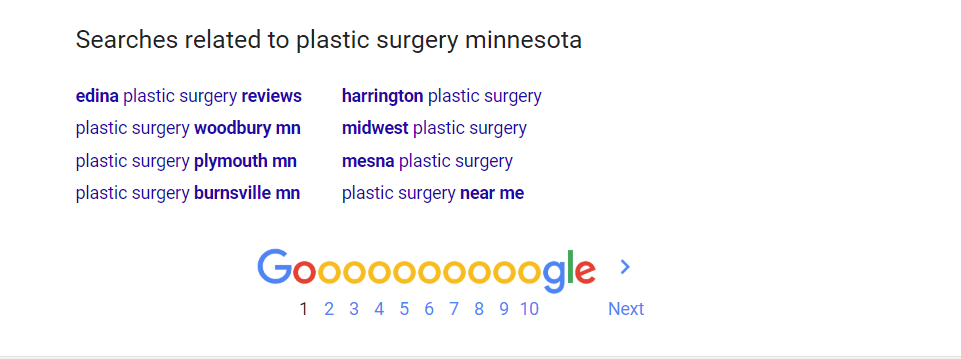What is SEO and how can it help your Plastic Surgery Practice?
As a plastic surgeon, your main focus is to give patients fantastic results. However, providing results is not enough to grow your business. In reality, what you really need is a steady flow of potential clients scheduling consultations with you year round. There are many ways to grow your practice. People can refer business to you, you can do mailers, TV, Radio, Print, and more. Here in this article, we are going to explore the art of
plastic surgery seo.
However, for plastic surgeons, one of the most effective ways to advertise your business is to show up online in front of those ideal clients who are actively seeking out your service. This is possible with Search Engine Optimization (SEO). What we’re trying to do with SEO is to optimize your website to show up at the top of Google whenever someone in your local area searches on their phone or laptop for things like:
“plastic surgeon in {your city}”
“rhinoplasty {your city}”
“{your city} face lift”
“cosmetic surgery near me” etc.
This can be incredibly powerful for your practice, as there are people every single day and month who search up these phrases and are actively seeking out your service or to get more information at the very least.
Now let’s break down what Google’ Search currently looks like:
The Anatomy of Google's Search Results in 2020
Computer/Laptop:
Mobile:
In this example, notice how if you typed “plastic surgeon los angeles” on your computer, that there are 3 organic businesses in the map pack, and then Yelp and Marina Plastic Surgery’s website. Results are similar in this scenario, but it can drastically vary between devices. Why is this the case, and how come websites like Yelp rank higher than other websites?
Welcome to Google’s Search Algorithm.
You see, as soon as you hit “search” on Google, there is an incredible amount of data, testing, and number crunching that is processed to display and determine why Wikipedia, Yelp, or various websites rank higher than other websites.
Similar to a quality score, based on a multitude of factors, Google generates a quality score for a site/page in relation to the given search or keyword to determine why your website, or webMD shows up higher than any other website.
This is incredibly important to know as SEO is essentially the science of figuring out Google’s Search Algorithm, and optimizing your website to match those criteria and give you a higher quality score than competitors to outrank them for keywords. Even Yelp and Wikipedia.
In the case of laptop vs mobile results, Google’s algorithm also recognizes that the kind of information a searcher on mobile might be looking for might be different than when at home on your laptop. Therefore, their results page reflect the differences.
*Hint If you see sites like Yelp ranking highly at the top of Google for your local search term, it’s a good indicator that the competition is not tough. This is the case because if your competitors hired a quality SEO company, they should be able to outrank Yelp, which would mean tougher competition. If your SEO company tells you it’s difficult to outrank Yelp, ditch them.
Ultimately, once you get on the first page (and ideally, the top of the first page), for your main keywords that your clients type in throughout their research and buying process, you will get an explosion of traffic and enquiries to your office and will be booking appointments year round.
Now that you know what SEO is, let’s break down an effective SEO campaign, specifically for Plastic Surgery.
1. Set Realistic Expectations, Goals, & Timeline
Goals/Expectations/Parameters
Realistically, SEO goals, expectations, and timeline can vary drastically between scenarios.
As a general rule of thumb, older sites tend to rank faster from SEO results than newer websites. Also, you don’t want to over-optimize with SEO or you will be penalized for it and results will take even longer.
This is why every SEO campaign must be taken case-by-case and not one campaign should have the same expectations, goals, and timelines, as the other.
Here are some examples:
Let’s say there’s three dentists in a local area who are looking to do SEO for their business:
One dentist has not done much with their website over the years, but the website still comes up online when you search the brand name.
Second dentist has owned the website for a while, and has done SEO with other agencies before and have gotten so-so results over the years.
Third dentist is pretty new to the area and the website went live a few weeks ago and is looking to do SEO.
In these various situations, the first dentist might have to fix their foundation, meaning the site might need mobile optimizations, content updates, navigation & canonical mistakes, etc. The heavy emphasis is on the initial tune-up the website will need before starting to do the Off-Site SEO.
Expect results in 3-5 months.
In the second situation, if the dentist has done SEO over the years and is showing up for some keywords, it means that we can be more aggressive with our link building and content strategy and optimize around existing socials like Facebook and Google My Business. On page optimization will also be necessary but it will probably be up to date.
Expect results in 1-4 months.
In the third situation, the dentist needs to do SEO very slowly at first in order to avoid being penalized, and probably will need foundational help such as optimizing/creating Google My business, content, etc. The site will not show up for keywords for a while and the main focus is doing clean SEO before google gives the Green light to go full steam with off-page SEO.
Expect results in 6-8 months.
What Kind Of Results To Expect?
Referring back to my Anatomy of Google Search 2020, here is a good estimate of percent traffic captured based on ranking on the first page:
Rank 1 - Expect to capture ~ 40-50%+
Rank 2-4 - Expect to capture ~20-40%
Rank 5-7 - Expect to capture ~ 10-20%
Rank 8-10 - Expect to capture ~ 5-10%
Conservatively, let's say you get on the bottom of the first page for a group of keywords totaling 1,000 searches/month.
At Rank 8-10, you can expect to capture 5-10%. On the lowest end, let’s say we capture 5% of search traffic. 5% of 1,000 = 50 visitors/month. Then, out of those, if even 1 in 10 of them are interested and looking to schedule an appointment, that means 5 more appointments/month.
Then out of those 5, you could bring on an additional 1-5 more surgeries/month.
For reference, at the #1 spot, that would translate to 50 more appointments / month. This is why SEO can seriously take your practice to the next level. Although SEO is intangible and can seem overwhelming, the results are very real.
So now you know what kind of results you can expect and timelines for various situations, let’s jump over to the next step: keyword research.
The Power Of Keywords
One of the most important aspects of an effective SEO campaign is proper keyword research. First, you want to group and prioritize keywords based on relevancy, search volume, difficulty, and how close to the buying cycle the keyword is. Then, map out the website and plan out exactly which pages will rank for which group of keywords. This is mission critical as you don’t want multiple pages on your site to compete for the same keyword, and you want to make sure the relevant page is showing up for the search phrase. If there are any keywords that are not relevant to your practice, then simply remove them from the list, with the goal of eventually getting on the first page for all remaining keywords.
Note, specifically in the plastic surgery niche, most cities have at least 1,000 monthly searches from people searching up keywords related to plastic surgery. If you get even 1% of that search volume, that could be an additional 10 more appointments and consultations a month.
One of our favorite tools here at Digital Uptrend is a tool called Ahrefs. It helps us see certain metrics on keywords such as how often it is searched per month, how competitive it is, etc.
Here is an example of a list of keywords we would target for a local plastic surgeon in Denver:
Note* Volume is the number of times that phrase is searched/month.
Summing these up, that’s over 2,000/monthly searches just for keywords related to plastic surgery and Denver.
On Page (Technical) SEO
There are a lot of articles about the On Page factors that impact Google's search algorithm. For plastic surgeons serving a local area, and for local seo in general, these are some of the most critical things to fix with your site that we often come across:
1. No/Duplicate Meta Description on Important Pages
Often times, here at Digital Uptrend we often find websites with no/duplicate Meta Description on important and ranking pages. Writing unique meta descriptions on these pages is a quick but very powerful fix because it helps with controlling keywords and with click through rate.
Below is an example of the SERP for “seattle plastic surgeon” and our rankings from best to worst.
Which one would you most likely click? Which one best describes your current meta descriptions?
Hint*: If you’d like to take a look at your meta descriptions go to Google and use this:
site:yourwebsiteurl.com
and you will be able to pull up all your indexed pages like so:
2. Site Speed
A slow site can have an adverse effect not only with the user experience (most people will “bounce” out of a site within 2 seconds of a page not loading), but it is also a huge ranking factor as high bounce rates will negatively impact your rankings, and Google explicitly stated that (especially mobile) page speed will be a ranking factor.
Two free tools we use to test page speed is Google’s own PageSpeed Insights Tool (https://developers.google.com/speed/pagespeed/insights/) and GT Metrix (https://gtmetrix.com/)
Before and after photos are integral to plastic surgery websites, but a lot of high resolution pictures can quickly slow site speed. Be sure to compress all photos when uploading to your website!
3. Duplicate Content
Duplicate content can confuse Google’s algorithm and lower Google’s quality score of your site. When you have duplicate content, Google’s crawlers have a hard time determining which page to give credit for which keywords. On top of this, it costs Google’s crawl budget when they have to crawl a page that does not add additional value (as it is just a duplicate page) and will dock points from the site because of this.
Siteliner is a great free tool that can help analyze duplicate content on your site for up to 250 pages. Below is an example report of a site with too much common content and not enough unique content:
Common content means content that is similar across multiple pages. In fact, only 15% of their entire site has unique content. Re-writing content or removing unnecessary pages is mission critical as too much duplicate content will negatively impact your SEO and rankings.
4. Wrong Pages Showing Up For Wrong Keywords
In many local websites, the wrong page, or more often times, the home page, could show up in the search results for a query that would have been much better if a different page showed up. This can happen from a multitude of reasons such as the content on the page, having too much content on the home page, and/or having most of your links and anchor text pointing to the wrong pages.
Take a look below:
The keyword I typed was “rhinoplasty gainesville” and yet their directions page is what came up for that keyword even though they have a separate rhinoplasty page.
To fix this problem, first check your content. Make sure that the incorrect pages do not have target keywords in the content, and then make sure that the relevant page has the keyword a few times (don’t over do it), and is a well-written page with 700+ words of good content.
One powerful tactic to gain more relevancy in your content is to look at Google’s LSI (Latent Semantic Indexing) Keywords, and layer them into the content.
To do this, simply search up the target keyword on Google and scroll all the way down until you see something like this:
Minus the specific surgeons, in your page, you would ideally want to include the keywords:
plastic surgery woodbury mn
plastic surgery plymouth mn
plastic surgery burnsville mn
midwest plastic surgery
plastic surgery near me
Another thing you could do, is use a tool like surferseo to analyze the content of top competitors and see what phrases are shared between them to use in your own content. The advantage of this is you know google likes the content and vocabulary or else they wouldn’t be on the first page.
Off Page SEO
Off Page SEO could be a massive post on its own, but is an integral part of SEO that is often overlooked by local SEO marketers.
In a nutshell, Off-Page SEO involves the outside SEO factors that Google’s algorithm takes into account when analyzing the quality of the website. One way Google’s algorithm analyzes this is by looking at the backlinks pointing to the site.
But what’s a backlink?
A backlink is any time another website links back to your website via a hyperlink. A hyperlink is anytime there’s a part of a text that’s clickable and takes you to a different page or website.
For example, here is a “backlink” to our website:
https://www.digitaluptrend.com
^ If you were to click this text, you would be directed to our website, Digital Uptrend.
So in this case, I am getting a backlink from this website because a page within this website is referencing back to our site.
This is a good thing in Google’s eyes because it essentially means that there is someone out there that is talking about the site and referencing the site. So when a lot of high quality websites link back to your own website, it tells Google’s algorithm that you’re the kind of site that others like to talk about, and if you have a lot of them doing that, it probably means it’s trusted by the community and should be more valuable than other websites who aren’t as talked about as much. Essentially, it’s like a popularity game.
Be warned, however, that not all backlinks are the same. If a website is not relevant to your niche and/or have a lot of authority, then it will do nothing, or worse, hurt your SEO rather than help it. One way to check the quality of your SEO company is to check the quality of your backlinks. A terrible SEO company will have done no backlinks, a mediocre SEO company will sign up with a platform like Yext and call it a day, and a good SEO company will get specific industry related and location relevant backlinks.
Here are some methods to get quality backlinks:
#1 Create accounts/pages at all the most popular social platforms (ie: Youtube, Facebook, Twitter, Linkedin, Instagram, YellowPages, Alignable, etc) and link back to your website
#2 Find industry specific directories and submit your information to be added to the directory. Even paid ones may be worth the cost. For plastic surgery, here are just a few of the directory sites we were able to find:
https://www.healthgrades.com/ (Link to create profile here: https://update.healthgrades.com/?pCID=hg-doc-footer-button)
https://www.topratedlocal.com/
https://www.superdoctors.com/index.html
https://www.imcas.com/en/account/create
https://www.rhinoplastysociety.org/application-procedure
https://www.smartplasticsurgery.com/contact-us/
#3 Find location specific directories and submit your information to be added to the directory.
Hint* Try searching up things like “{your location} directory” or “{your location} business page/listing” to find these local directory sites.
#4 Any accreditations, or boards you’re a part of, or certifications you received from a specific institution usually all have websites that are highly authoritative and relevant. They may not know what you might be asking, but it’s worth a shot to reach out to their contact us page and see if you can ask them to mention your website next to your profile or to ask to create a profile.
#5 Local chamber of commerce, and other local business owners. Local business owners linking back to your site will bring a lot of location relevancy to your site and has worked as a quick win for many of our clients. Reach out to your business friends/networking friends, and ask them to link to your website. You can offer to do the same as “businesses we trust.” As a bonus, it will show site visitors that you are genuinely connected to the local community and recognize other local business owners. After all, everyone loves supporting local business.
Google My Business Optimization
We couldn’t wrap up this article without mentioning Google My Business. After all, breaking down the anatomy of search results earlier, you’ll notice that those 3 featured spots on the map (aka the “Snack Pack”) is at the top of the search results. In other words, it’s really important to get on one of those spots. While there are some overlays between regular SEO and GMB SEO, here are two additional factors you need to optimize in order to snag one of these coveted spots.
#1 Citations
Similar to directories, these are authoritative directories that require you to submit your Name, Address, and Phone Number (NAP) into the directory. These include sites like: Bing places, Google Places, Yahoo Local, Yelp, Foursquare, Tripadvisor, angieslist, citysearch, superpages, yellowbook, merchantcircle, manta, etc.
Remember, when you submit your business information to these directories, make sure that you use the EXACT same text for the address in all directories. For example:
2440 Colorado Blvd,
Denver, Colorado 80911
Is different from
2440 Colorado Boulevard,
Denver, Colorado 80911
Notice how on one, Boulevard is shortened to Blvd, while in the other address, the Boulevard is spelled out. Pick one and stick to the same exact address across all directories.
#2 Create a process to generate google reviews. Reviews are part of the algorithm, and in order to generate reviews, you need to be persistent about it with customers. Be sure to get every customer’s email and contact number and ask them to leave a review for you after the surgery. Even if you have to incentivize these reviews, it is worth it. Take a look at the map results for the keyword “plastic surgeon mcallen tx” that gets 400 searches/month:
Who would you most likely reach out to if you were the customer?
If you’ve made it all the way here, congratulations and I hope you learned something along the way.
Please feel free to reach out if you have any questions about the article. Also, we have helped all kinds of businesses in various situations including:
Have tried SEO with another campaign and it didn’t go very well
Currently working with SEO and not sure about results
SItes that were Penalized
Have never done SEO before
Brand New Business
Transfer of Ownership
Changed Locations
So if you are looking for an
Colorado Springs SEO company, then we’d be happy to look at your situation and see if we’d be a good fit.


